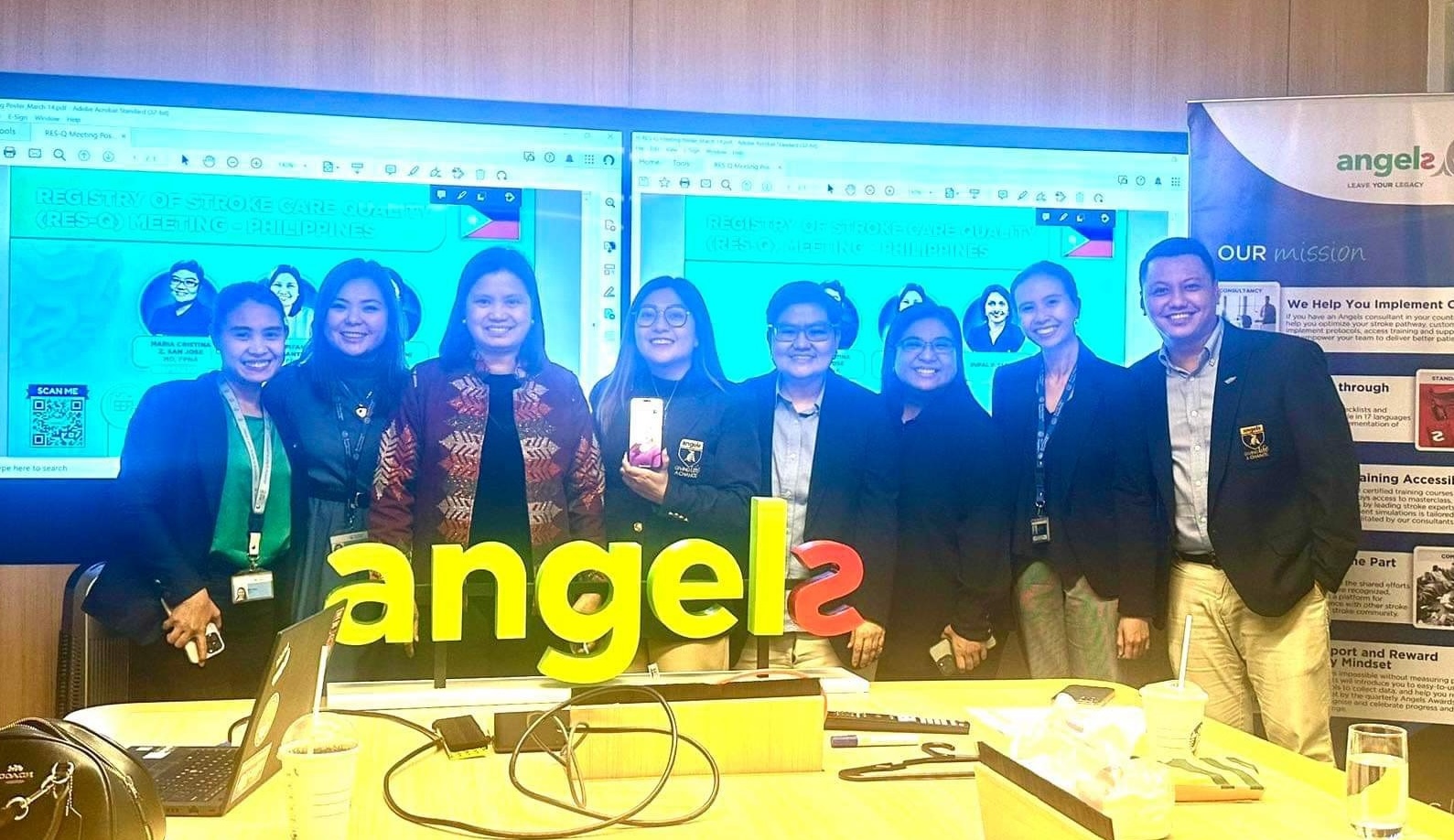
V lednu 2024 měl registr zlepšení kvality cévní mozkové příhody RES-Q příběh, který by měl vyprávět. Registr se chystal spustit svou zcela novou platformu připravenou na budoucnost na nové webové adrese. Nová platforma má několik atraktivních nových funkcí, pro které předchozí platforma postrádala kapacitu. Ty zahrnovaly funkci jednotného přihlašování pro přístup k více účtům, intuitivnější sběr dat dostupný v 15 jazycích, uživatelsky přívětivé ovládací panely a možnost generovat zprávy na vyžádání.
Byla zahájena kampaň, jejímž cílem je informovat globální komunitu pro cévní mozkové příhody o nové adrese URL a ujistit je, že migrace jejich starých dat bude zahájena, jakmile se znovu zaregistrují na nové stránce.
Zatímco konzultanti Angels po celém světě přistoupili na pomoc nemocnicím v jejich zemích se změnou, tým na Filipínách si všiml příležitosti. Od významného setkání v Manile uplynulo přibližně osm měsíců, během nichž nemocnice připravené na mrtvici absolvovaly praktické školení o tom, jak a proč používat RES-Q.
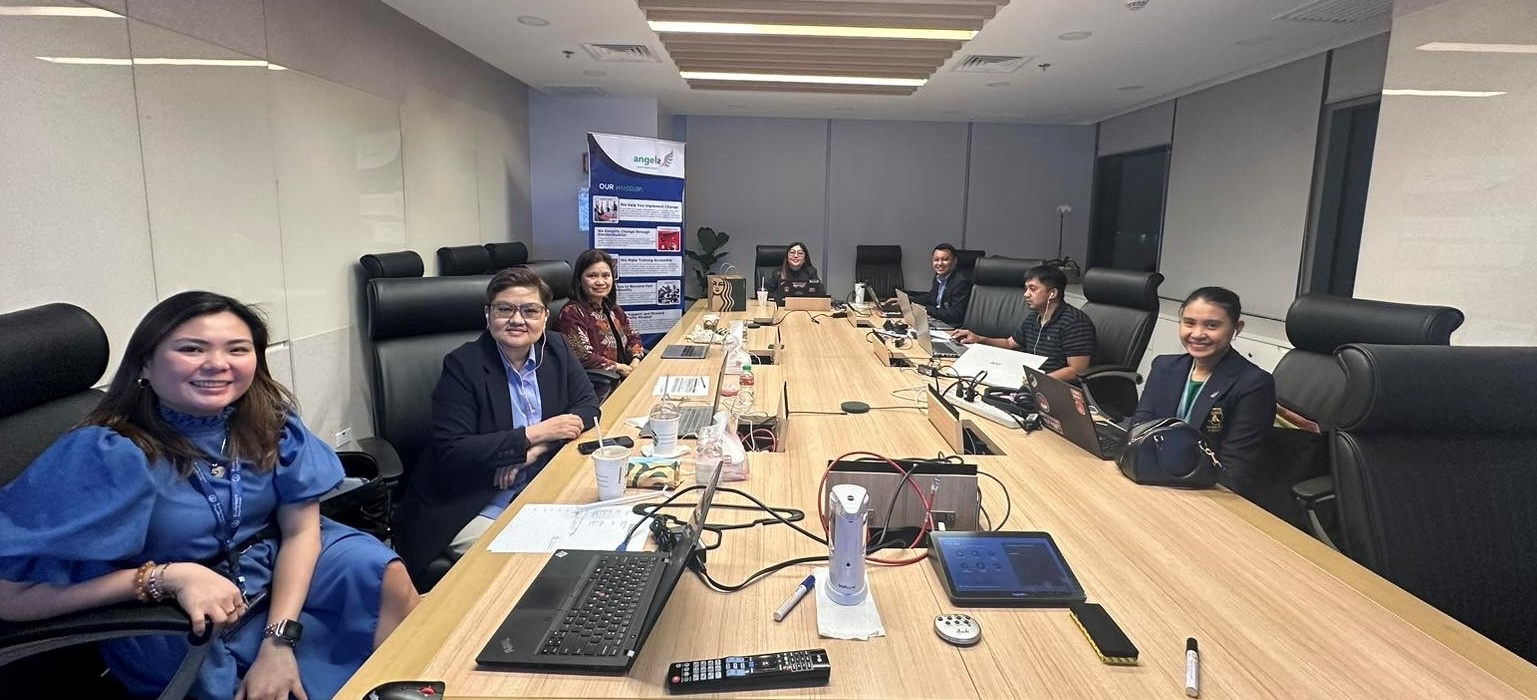
Monitorování kvality je požadavkem certifikačního programu akutní nemocnice připravené na mrtvici (Acute Stroke Ready Hospital, ASRH), který byla spuštěna na začátku roku 2023. Cílem setkání v Manile bylo změnit vnímání procesů sběru dat a spojením odborníků na péči o cévní mozkovou příhodu ze 47 nemocnic s certifikací ASRH na jedné akci se jim podařilo zažehnout mnoho svíček jedním plamenem.
Uvedení „nového“ modelu RES-Q přineslo další příležitost ke kvalitnímu setkání zaměřenému na monitorování – tentokrát on-line, abychom se dostali k ještě více nemocnicím.
Webinář, který se konal večer 14. března, se zúčastnil více než 300 účastníků zastupujících 75 nemocnic a znovu prokázal synergii mezi Angels a SSP. Setkání se zúčastnili dva bývalí prezidenti SSP, kteří nyní sdílejí roli národního koordinátora pro RES-Q, Dr. Maria Epifania Collantes a Maria Cristina San Jose, s závěrečným prohlášením současné prezidentky SSP Dr. Maria Socorro Sarfati. Hlavní událostí byla virtuální prohlídka nové platformy RES-Q, kterou vedl globální manažer RES-Q Rupal Sedani, který se propojil z České republiky.
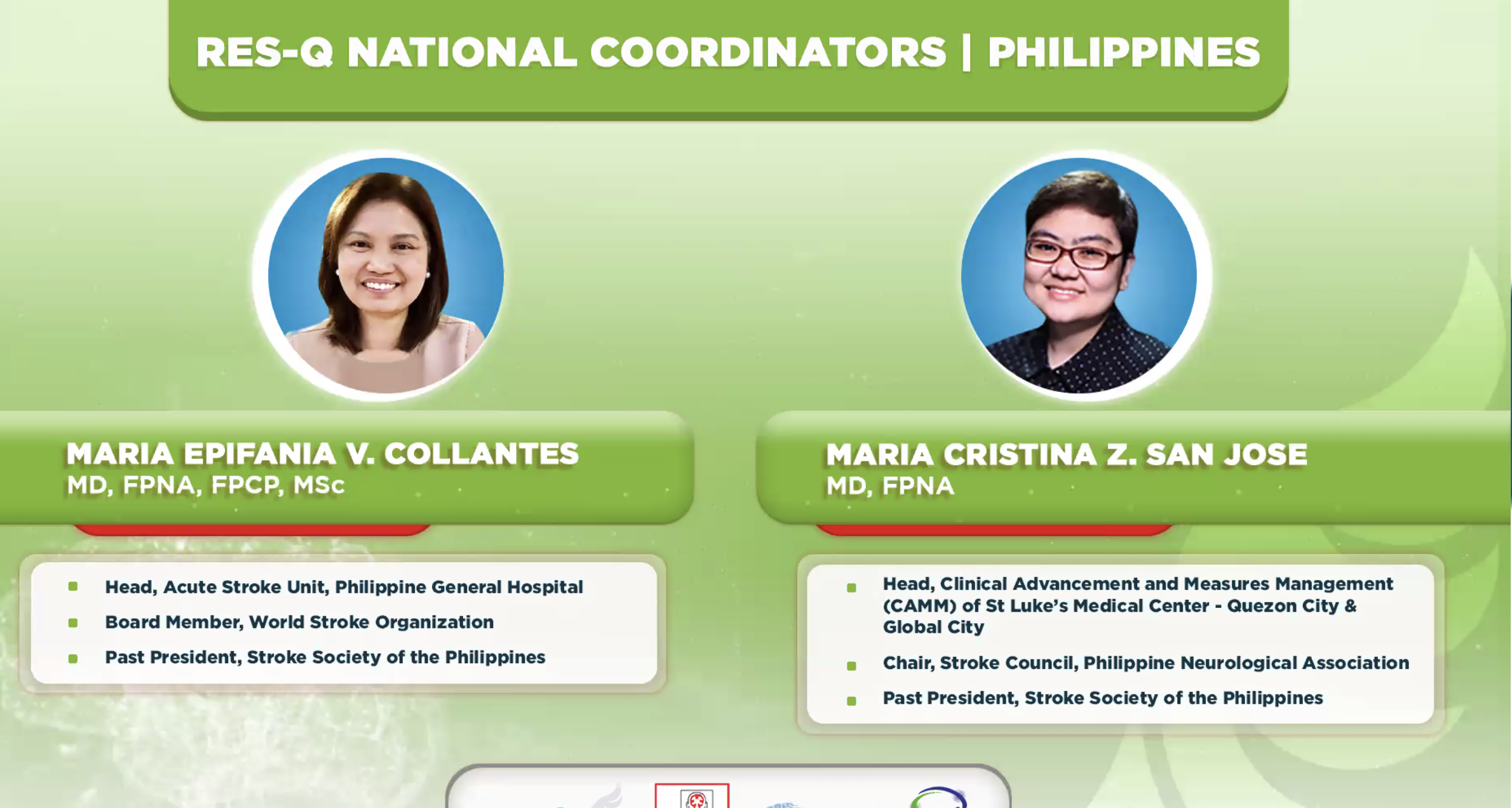
Proč provádět monitorování kvality
Přijetí RES-Q jako národního registru bylo příležitostí ke zlepšení péče o cévní mozkovou příhodu od samého počátku, řekl Dr. Collantes. Shromažďování a analýza dat přinesla výhody jak v místě péče o pacienty, tak ve vztahu ke změně zásad. Kromě identifikace nedostatků a výzev na úrovni nemocnice by monitorování kvality mohlo mít dopad na zásady poskytováním údajů o rizikových faktorech a uváděním v omyl v otázkách, jako je genderová nerovnost a socioekonomické a regionální rozdíly. Může pomoci odhalit příčiny zpoždění léčby, zlepšit časové osy a výsledky cévní mozkové příhody, trendy v grafech a nakonec vést ke snížení mortality.
Bylo však nutné, aby údaje byly úplné a přesné, aby bylo možné získat jasný obraz o léčbě cévní mozkové příhody v celé zemi.
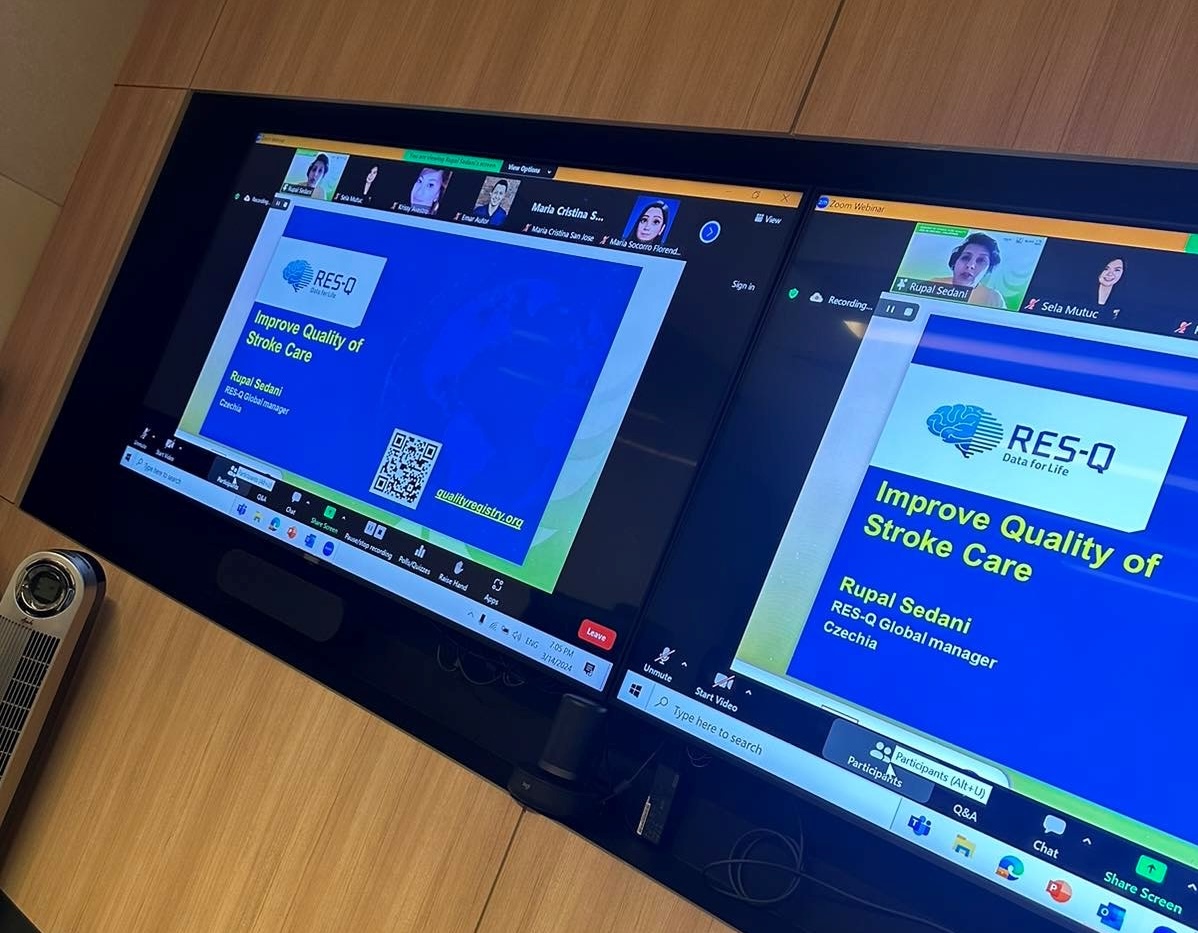
Dr. San Jose řekl, že využití RES-Q bylo klíčovým facilitátorem zdravotní péče založené na důkazech a zlepšování kvality na Filipínách. Sledování kvality bylo jednou z hlavních strategií propagace a začleňování zdravotní péče založené na důkazech, což znamenalo zajistit, aby byl celý systém poskytování zdravotní péče založen na principech založených na důkazech.
Sledování kvality umožnilo systémovou kontrolu péče podle explicitních kritérií, řekl Dr. San Jose. Data podněcovala i vyvíjela zlepšování kvality tím, že pomáhala identifikovat a analyzovat problémy. Získané informace byly základem pro rozhodování a rozhodnutí vedou k opatřením.
Shromažďování údajů také umožnilo srovnávací měření a porovnání výsledků a procesů s výsledky a procesy konkurentů a předních představitelů odvětví vedlo k úsilí o lepší výsledky.
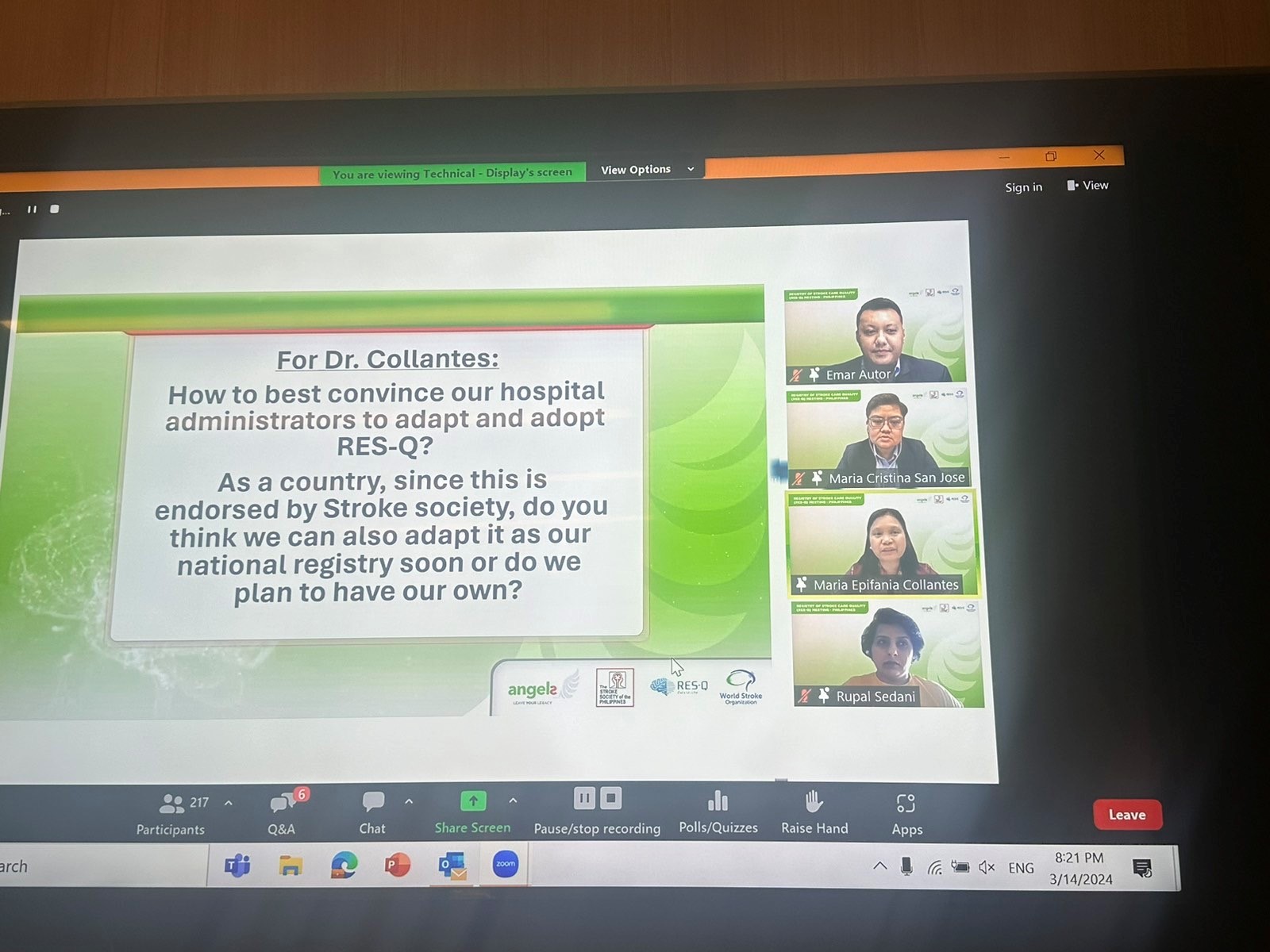
Udělejte si z toho zvyk
Doba dotazování následovala po virtuální prohlídce vylepšené a uživatelsky přívětivé platformy RES-Q, která přinesla další poznatky:
Otázka: Jak byste měli přesvědčit správce nemocnice, aby přijali RES-Q?
Dr. Collantes: Řekněte jim o výhodách a ukažte jim, jak mohou být data použita ke zlepšení péče o cévní mozkovou příhodu.
Otázka: Budou mít Filipíny vlastní registr?
Dr. Collantes: RES-Q je náš národní registr cévních mozkových příhod. Je mezinárodně uznáván a poskytuje zpětnou vazbu v reálném čase, která umožňuje zlepšení.
Otázka: Kdo by měl převzít odpovědnost za RES-Q v naší nemocnici?
Dr. San Jose: Identifikujte svého šampióna v oblasti změn – někoho, kdo se zavázal používat data ke zlepšení kvality.
Otázka: Jaké jsou nejlepší postupy pro hlášení a sdělování výsledků monitorování kvality ve vašem oddělení nebo nemocnici?
Odpověď na tuto otázku byla jádrem toho, co to znamená zavázat se k neustálému zlepšování kvality a lepším výsledkům pro pacienty. Pouze čtyři slova dlouhá, obsahovala radu, která, pokud by byla přijata nemocnicemi, by dosáhla všeho, čeho bylo zamýšleno, aby bylo dosaženo jakékoli aktivace monitorování kvality, včetně tohoto webináře.
Dr. San Jose neváhal ani chvíli: „Zvykněte si to,“ řekla.


